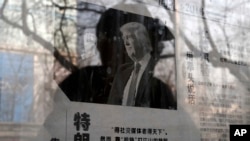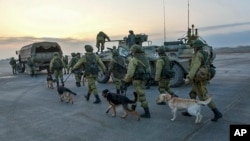Is President-elect Donald Trump a foreign policy realist or idealist? Is he bringing Richard Nixon’s hard-edged realpolitik to his foreign policy or following in the footsteps of the more idealistic Ronald Reagan?
The question has become a parlor game among Washington's policy pundits.
Trump’s frequent invocation of Reagan’s “peace through strength” mantra and campaign pledge to rebuild America’s “depleted” military has invited comparisons to the Republican icon credited with winning the Cold War.
His advocacy of a foreign policy based on America’s national interests has led some to liken it to Nixonian realism, while his aversion to foreign interventions has won him the label of a non-interventionist and even isolationist.
Don’t fence Trump in
Trump has professed no great power doctrine and his advisers discourage applying labels to his vision of the world.
“I’m not going to be put into the little academic, graduate school box because I think it doesn’t suit, and it doesn’t apply in a rapidly changing world,” said K.T. McFarland, Trump’s incoming deputy national security adviser, when asked to describe the Trump doctrine.
While Trump’s call for “peace through strength” reflects Reagan’s view of deterrence, “there are parts of Nixon and (Henry) Kissinger that Donald Trump has also advocated,” McFarland said at the U.S. Institute of Peace, alluding to Trump’s interest-based approach to world affairs.
Trump’s speeches
A foreign policy neophyte, Trump has shied away from declaring any grand foreign strategy during the campaign, though he did give two major speeches devoted to foreign policy and national security.
In the first speech, delivered at the realist-leaning Center for the National Interest in Washington in April, Trump outlined what he called a “coherent foreign policy based on American interests” and called for “getting out of nation building,” creating stability and quashing “radical Islam.”
Watch: President-elect Trump's Emerging Foreign Policy
“Containing the spread of radical Islam must be a major foreign policy goal of the United States and indeed the world,” Trump said. “Events may require the use of military force, but it’s also a philosophical struggle, like our long struggle in the Cold War.”
In the second speech, at Youngstown University in Ohio in August, Trump ratcheted up his rhetoric about terror, warning countries around the world that they’d be judged based on their commitment to the U.S. goal of fighting terrorism.
“All actions should be oriented around this goal, and any country which shares this goal will be our ally,” Trump told a rally of supporters.
‘Strategic surprise’
It was a theme that Trump would repeat, in one iteration or another, throughout the campaign, but his advisers say Trump’s pre- and post-election pronouncements on foreign policy, often delivered off the cuff, should not be read as policy prescriptions.
“Actually, he didn’t say a lot about foreign policy and national security on the campaign trail, and what he did say really doesn’t add up to a policy,” said James Carafano, director of foreign policy at the conservative Heritage Foundation who advises the Trump transition team on foreign affairs. “That’s very frustrating because the people want to know what’s this guy going to do.”
With the new administration yet to take office, McFarland, too, cautioned that Trump’s foreign policy is in an early stage of development.
“That’s what a new administration does: It takes time to rethink things and to come up with policies,” she said.
If history is any guide, Trump could quickly find himself facing a set of foreign policy crises different from the issues he campaigned on. Political scientists have a term for an unexpected world event that drives a new president into uncharted territory: “strategic surprise.”
For former President George W. Bush, who campaigned on pursuing a “humble foreign policy,” the strategic surprise came September 11, 2001.
For President Barack Obama, who vowed to end the wars in Afghanistan and Iraq, the “Arab Spring” protests in North Africa and the Middle East marked a strategic surprise, leaving his administration more deeply mired in the region than he’d hoped.
What international crisis might alter the trajectory of the Trump administration’s foreign policy agenda has become a guessing game, with the number of scenarios exceeded only by the variety of foreign policy labels attributed to Trump.
A game-changing terrorist attack on American interests is one possible candidate. Another contender: an Intercontinental Ballistic Missile (ICBM) launch by North Korea.
“I think the world is not necessarily going to allow President Trump to do everything he’s planned on,” said Blaise Misztal, director of the national security program at the Bipartisan Policy Center in Washington. “I think you’re going to see a triangulation between what he’s said, what he’s advised to do, and what is actually feasible on the world stage.”
Flip Flopping on Issues
While Trump has flip flopped on some issues, NATO and torturing terrorists, for example, he’s held steady on others. Among them: terrorism, trade, China and Russia.
In the weeks since his election, he’s reiterated his pledge to make terrorism a focus of his foreign policy, talked tough on trade, challenged the “One China” policy, and iterated again a desire to reset relations with Russia even as he embraced intelligence findings that Moscow interfered in last year’s presidential election.
Brian Katulis of Center for American Progress, a liberal Washington think tank, said the “most radical shift” Trump will likely undertake will be “engagement and involvement” with Russia, something Obama unsuccessfully attempted during his first term in office.
But former CIA director Michael Hayden said Trump is likely to reconsider his approach to Russia once he learns from intelligence agencies and allies that Russia and Syria are not committed to fighting IS.
“I’m personally very, very skeptical of any convergence between American and Russian interests in this part of the world,” Hayden said. “In fact, I’d offer the view that American and Russian interests are actually heading in different directions.”
Another major change: downplaying a postwar American foreign policy tradition of promoting democracy and freedom around the world.
“Trump has signaled as a candidate and in the transition a proclivity to appreciate authoritarian and repressive leaders around the world,” Katulis said. “And this may be the biggest departure that is historic, that there really won’t be as much of a values-based approach that focuses on human rights democracy and freedom in other countries. And that I think puts the United States itself on shaky territory.”
But McFarland played down those concerns, saying “the three bedrocks of (postwar) American foreign policy” — American leadership, American values and international alliances — will remain under the Trump administration.
Unpredictability
There is usually some continuity between administrations on foreign policy, but “that rule actually may not apply under Trump,” Katulis said.
“We’re dealing with something here that is just fundamentally different and off the charts,” Katulis explained.
That 'something' is Trump’s well-known unpredictability. Trump has criticized President Obama for telegraphing his policy moves and has vowed to remain unpredictable. But experts say unpredictability can be dangerous in the international arena where both allies and adversaries expect a certain degree of predictability from the United States.
"Predictability is the cornerstone of deterrence," Colin Clarke, a political scientist at RAND said. "You need to be predictable if you’re the United states, both in what your allies know you’ll do and in what your adversaries know you’ll do and how you’ll respond."



